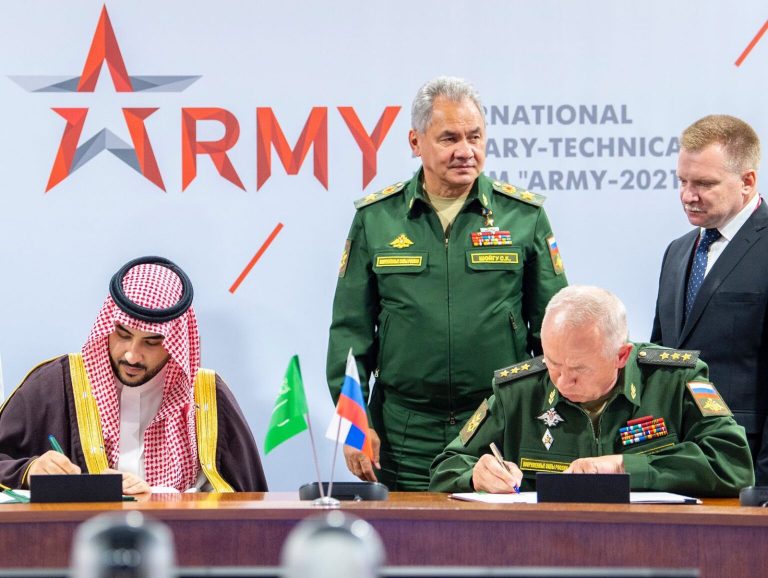Russian Federation has signed a military cooperation agreement with the Kingdom of Saudi Arabia (KAS) on the 24th of August. This is another signal that there is an ongoing shift in the balance of power in the Middle East, but what does that agreement tell us?
The bigger picture in the region
Russia is already trying to reposition itself in Afghanistan. We can expect swift actions and possible arms deals when the Taliban government finally is established, as this is one of the most favoured tools of influence used by Kremlin. The Taliban forces are also trying to make an economic comeback thanks to China, but this plan is still in very early stages.
Russia is also closely following the situation in Iraq. If we add all of this together, then obviously a lot of tiny steps are being made by Putin’s diplomats in the region. Both China and Russia are major threats as seen by the US, so gaining traction in the broader region might be seen as a threat to global American politics.
A slow shift of Saudi Arabia towards Russia would be a sign of yet another country lost by the United States. This of course, if ever, won’t happen overnight. There is still time to act, but the question is if the US wants to act. An even more important question is if it has the power to act as a balancer in the region.
If we look from a broader perspective, it might look like the administration in Washington is cutting loose ends to prepare for a bigger fight in the far east. This in turn leaves the region unwatched and possibly falling into chaos, which would be a real threat, for instance to Israel.
The Israel angle of the matter
Without the US Israel will have to more actively work in the region because of the possible Iranian threat. In fact, it already does so, and Saudi Arabia is one of the silent partners of Tel Aviv. Russia has also good relationships with Israel.
Kremlin actions and pulling some strings in the region to elegantly turn the situation to its favour, could also be beneficial to Israel and Saudi Arabia, as they both aren’t in love with the Iranian regime. This cooperation, from the Israeli perspective, could potentially be bringing some more stability after the US withdrawal.
There are also signs that Israel is ready to strike Iran, which again would be in favour of Saudi Arabia. The current Washington administration would like to bring back Iran to the table of nuclear negotiations, but the situation is uncertain.
Threat to Saudi Arabia
The deal with Russia might be a serious threat to Saudi Arabia. The US doesn’t like Russia tightening bonds with US allies. Turkey got to know it the hard way, being kicked out of the F-35 program. What will happen to all the Saudi military equipment made in the USA if the cooperation with Russia would get tighter? Postponing the servicing and assistance would make the Saudi army practically unusable, and how badly such sustainment is needed can be observed in Iraq and Afghanistan. There is no easy way to replace American armament with high quality equivalents, and the Saudis are a constant client of US manufacturers. The Saudis might walk a thin line here.
A leverage for the Saudi
Saudis trying to cooperate with Russia might be seen as some sort of leverage which can be used in talks with the US. Recently, the US has stopped helping KAS in its Yemen offensive. The Pentagon is using a clever back door for some assistance with private contractors, but this might not be enough form Saudi perspective.
The recent deal might therefore be seen as poking the US to gain some more attention. This however won’t be easywith the current democrat’s administration.
A sign of collapse
The Russia -Saudi agreement might also be treated as a sign of collapse of previous US policies in the region and, more broadly, globally. The US has lost its power and can no longer be everywhere and guard its interests. This would mean that at some point there were bad decisions made in Washington. In consequence, they have allowed many actors around the globe to gain that much strength, that without sacrificing some regions and influence in them the US can no longer compete in the crucial regions. Pax Americana is ending, and with it the US active engagement around the world. This seems to be the new normal.
Or is it a chance?
Twisting the whole situation around, we could see the agreement as a chance for the Middle East to remain calm, at least to some extent. With the US leaving the scene to fight another war, all the pieces have to be rearranged. Russia stepping in with all of its connections might allow for some sort of balancing. This however is e very stretched and thin theory without much substance in it.
In the end, we don’t know any details of the agreement. It can be a one big nothing burger and there will be not much if any meat in it. Before making any bold statements, it would be best to watch for any follow-on agreements with some observable and practical outcomes and not just signed paper. One thing is clear. Russia doesn’t want to wait and steps in, using almost every opportunity. However, we should always take into account that Russian economic capabilities are very thin and much of its actions are just political stunts that are well directed and executed but without long term effects.
Post Author
Author
-

Ph.D. in liberal arts in the field of military history, specializing in military aviation, analyst in the field of military aviation, defense, modern warfare geopolitics and security.
View all posts





Pingback: AUKUS — a broader view, and a key answer - Robert Lansing Institute